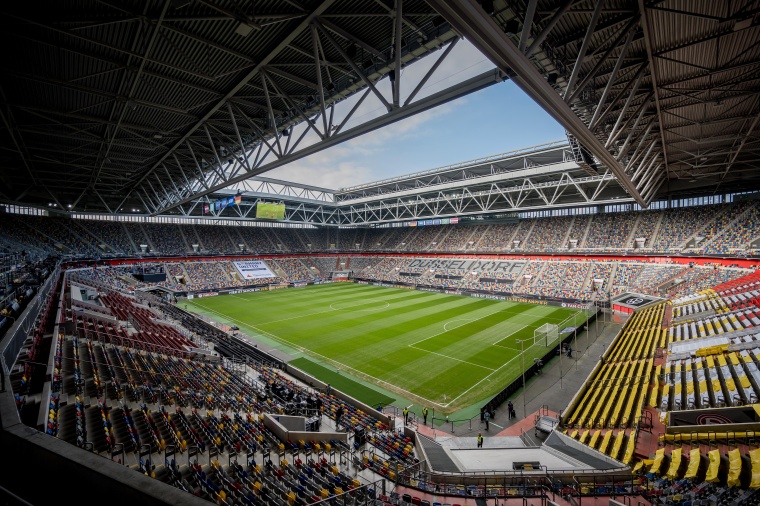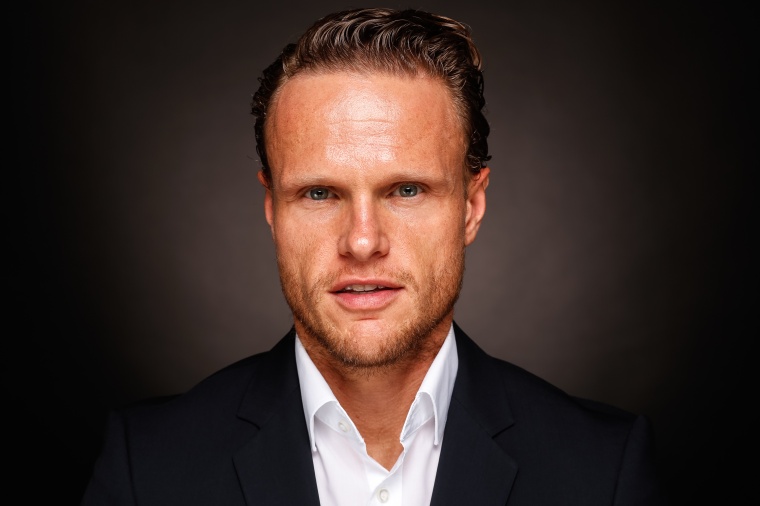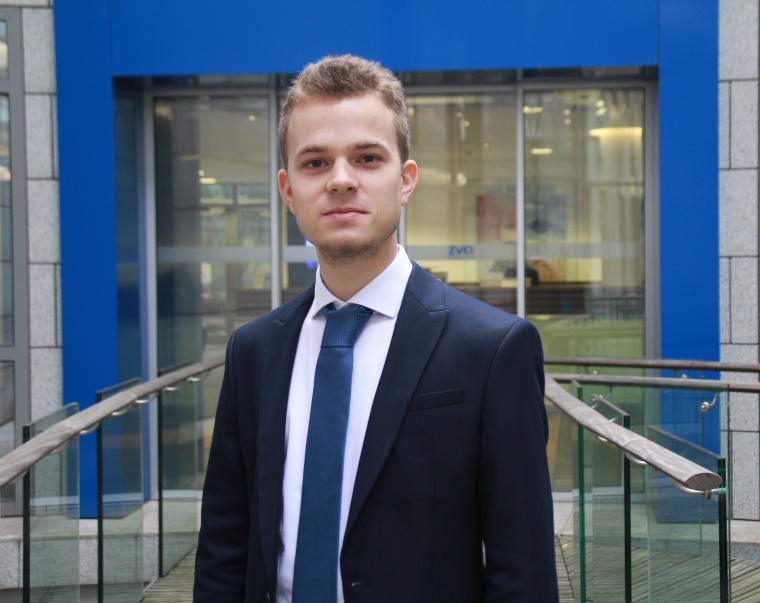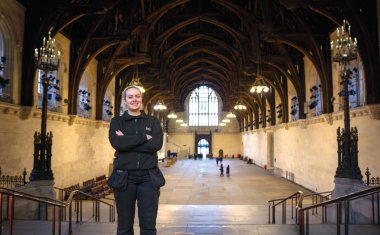Stadium Security: “Video Technology & Data Protection in Stadiums”
In its updated guidelines, the German Football Association (DFB) provides an extensive set of recommendations for using state-of-the-art video technology in stadiums. These have been drawn up with assistance from the Electro and Digital Industry Association (ZVEI). The new version of the practical guide, which was first published in 2013, takes account of technological progress and the latest developments concerning the legal framework. The guide was a collaboration between the Video Systems expert group at the ZVEI and Christian Delp and Gerhard Kißlinger, both of whom are the Stadium Officers at the DFB. One of the key reasons why the guidelines were revised was because of the EU General Data Protection Regulation (GDPR), which came into force in 2018. GIT SECURITY spoke to Fabian Stegmaier, Manager Safety & Security Technologies at ZVEI and Christian Delp, DFB Stadium Officer.



GIT SECURITY: Mr. Stegmaier, the DFB’s guidelines on video technology & data protection in stadiums have just been updated in collaboration with the ZVEI Video Systems expert group and released as a new edition. One of the major reasons for this was to take account of the EU General Data Protection Regulation (GDPR). From your point of view, what are the most significant amendments compared to the first edition in 2013?
Fabian Stegmaier: One of our central concerns during the revision was to incorporate the European data protection provisions, which have been in force since 2018. The comprehensive outline concept for the stadium and the stadium environment included in the guidelines therefore explicitly references the GDPR and the resulting data protection requirements. Our intention is to assist stadium managers in implementing video systems in a manner that they know to be fully compliant with the law. At the same time, the guidelines ensure that the privacy rights of fans and visitors are protected. And that’s because the increased security provided by video technology has to go hand in hand with the protection of personal data.
It was also necessary to update the technical requirements in light of the currently applicable DIN EN 62676 series of standards, because DIN EN 50132 – the standard on which the first edition of the guidelines was based – has since been withdrawn. Among other things, these cover the definition of the image quality in relation to specific surveillance and security objectives, which is now shown more clearly using relevant illustrations. The notes on the scopes of application (prevention, protection, response, documentation) have also been revised. Once again, we generally adopted the principle of showing how state-of-the-art technology and the underlying standards can be applied to the example of a stadium.
In addition to providing an overview of the applicable standards, the guidelines also concern themselves with the latest technology. Video technology is actually a very innovative and versatile element of security technology. Which developments were particularly important from the stadium operator’s point of view?
Christian Delp: As far as stadium managers are concerned, it represented a key milestone when the guidelines on video technology and data protection in stadiums were introduced.
In this way, we have created instructions and clarity for this complex subject area, with the result that all stadiums – from the Bundesliga right down to the third division (3. Liga) – now have high-resolution camera systems. In the interim, terms such as artificial intelligence are no longer regarded as gibberish within this sector. For example, cameras are able to identify people whose behaviour is unusual. One example: A person suffers a heart attack and collapses in a place where nobody else happens to be present. In such an event, the systems can set off an alarm and institute prompt and targeted assistance. The automated processes are a particularly good example of how visitors benefit from enhanced service and convenience. These range from controlling rights of access and car parks through to managing queues. There are lots of measures of this kind and they reduce the numbers of staff required. Every innovation is of course subject to rigorous checks to ensure that it conforms to data protection law.
How would you describe the co-operation between DFB and ZVEI? Does it include any other subjects or projects?
Fabian Stegmaier: The original idea of producing a comprehensive set of guidelines has developed into ongoing, constructive collaboration. For the second edition, we held several meetings to discuss the revisions required, which were then implemented. We made a conscious effort to harness synergies from co-operation between different associations. Combining practical experience with the conditions laid down by the DFB ensures that the guidelines address subjects of relevance to stadium operators. At the same time, we can – from the perspective of the manufacturers – contribute technological expertise and know-how regarding standards to help create well-founded and appropriate solutions for stadium operators. In view of our very positive experience of working on this project, we are currently in the process of collaborating in the area of Public Address and General Alarm (PAGA) systems in a similar way.
The DFB guidelines have actually been conceived as a decision-making tool for investments in stadium security. How has that been received and implemented in practice – at the DFB and by other stadiums and stadium operators?
Christian Delp: The concept has been very well received in practice. This is underlined by the large number of enquiries we have received about the update. The guidelines have helped many decision-makers to gain a better overview of the subject matter. As a result, they have been able to hold more purposeful meetings with various providers. The DFB’s ongoing consultation service has played its part in ensuring that the stadium landscape has been provided with practical solutions.
In your opinion, to what extent does video security as a whole actually contribute to achieving the security objectives of stadiums?
Christian Delp: Provided they are designed, implemented and used correctly, video systems can offer a great deal to clubs, authorities and fans. In this respect, the DFB and ZVEI have achieved what they set out to do. For stadium visitors, the primary benefit of state-of-the-art video systems is that they offer reliable technical solutions for preventive risk detection and enable the event to run smoothly without a hitch. The video technology – along with all its functions – is constantly being developed and enhanced to ensure a safe and enjoyable stadium experience.
Installing video technology in stadiums is a complex process because of the sheer number of parties involved – from the club and the police right through to skilled security staff. Structural measures and lighting systems also have to be devised, designed and implemented. This calls for a certain degree of specialisation and help from consultants – how does that play out for security managers in practice?
Christian Delp: A stadium is a complex entity made up of multiple elements, each of which is divided into many levels of its own. Each of these elements helps to create a safe experience for spectators in the stadium. The DFB employs two graduate engineers as the Stadium Officers to oversee the area of “Stadiums and Infrastructure” in the form of myself and my colleague Gerhard Kißlinger. We specialise and have been trained many areas, such as fire prevention, noise protection and security. Among other things, we act as representatives on the Standards Committee for DIN EN 13200 and the associated CEN Committee. These bodies are responsible for creating the standards on which stadium construction is based.
Which services does the DFB provide in this respect?
Christian Delp: We are able to provide the clubs with effective consultancy services thanks to the experience we have built up, and – in particular – the guidelines that have been produced, as well as our continuous dialogue with other experts in the field. The DFB Stadium Officers also act as an auditing body. We have to approve the respective systems and elements to ensure that games can go ahead. The DFB provides these services free of charge to all clubs and they regularly take advantage of them. The consultancy services include meetings with the respective stakeholders. The club in question therefore receives support with a view to installing systems that are not only viable but also cost-efficient.
How does that affect 3rd Division clubs?
Christian Delp: As part of an annual approval procedure, 3rd Division clubs have to complete a video technology report to demonstrate that the video technology system is fit for purpose. Fit-for-purpose solutions have been installed in consultation with the security managers at all locations. The fully comprehensive consultancy service means that it is not just a question of identifying solutions in an isolated way; rather, they are also coordinated with other issues, such as the German Regulations on Places of Assembly (VStätt-VO), lightning protection, noise protection, inclusion or sustainability. Essentially, we have to keep on advancing in what is a very wide and varied sector. And with that in mind, the DFB engages in dialogue at both a national and an international level.
Can you name any comparable developments in the field of stadium security that are helping to improve stadium safety and security, including in relation to other elements – such as fire protection?
Fabian Stegmaier: Over recent years, continuous advances have been made concerning the elements in the area of electronic security technology. As far as the operators are concerned, these are now translating into new and improved applications, systems and services. For example, digitisation has opened up new opportunities in the field of electronic access/locking systems or fire protection installations, and these are making a contribution to security in stadiums. As a consequence, we are seeing increased networking of technology, which adds value and makes for faster processes. None of this is possible unless cyber security is ensured, which is why we have addressed this aspect explicitly in the guidelines.
Business Partner
ZVEI - Zentralverband Elektrotechnik- und Elektronikindustrie e.V.Lyoner Str. 9
60528 Frankfurt
Germany
most read

Assa Abloy's battery-powered Aperio KL100 secures lockers
Boost workplace security and operational flexibility by securing more than just doors.

Airbus Defence and Space: Security as a strategic pillar of Europe's defense capability
Airbus Defence and Space protects sites, technologies and employees with modern security and cyber solutions - strengthening Europe's resilience in uncertain times

Is Your Venue Ready for Martyn’s Law?
Martyn’s Law demands stronger security by 2027. Is your venue prepared to protect and respond?

GIT SECURITY AWARD 2026 - The winners have been announced!
GIT SECURITY AWARD 2026: The best safety and security solutions of the year - now an overview of all winners

Safety and Security in an Emergency: How companies take responsibility with strategic personal protection and amok prevention
Personal protection & amok prevention: strategic concepts, training & responsibility for corporate safety and security




